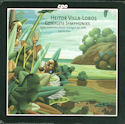 Villa-Lobos - Complete Symphonies
Villa-Lobos - Complete Symphonies
Stuttgart Radio Symphony Orchestra WDR; Carl St. Clair
CPO 777 516-2
The eminent Brazilian composer Heitor Villa-Lobos (1887-1959) took as his model for symphonic compositions the cyclic approach endorsed by Vincent d’Indy, regarded in the conservative Brazilian musical circles of his day as quite innovative. Though Villa-Lobos was to discover on first visiting France in 1923 that he was a generation behind contemporary trends in this regard, he doggedly held on to this model for the remainder of his works in this genre. The 12 symphonies are almost entirely cast in four often quite lengthy movements with very few traces of the indigenous Brazilian characteristics for which he is best known. His symphonies have never been as popular as his celebrated Bachianas Brasilieras and Chôros cycles and the majority of them have not previously been available in recordings. Fortunately the American conductor Carl St. Clair began the project of documenting these works in Stuttgart in 1997 for the innovative CPO label and we now have the complete works in an attractively priced box set.
The early symphonies date from 1917 to 1920; symphonies 2-5 are part of a cycle documenting the course of the First World War (the score of the fifth symphony however is lost). The French influence is prominent, including Debussian whole tone passages, lush harmonies and programmatic quotations of La Marseillaise. The Stuttgart forces cope admirably with the often cruel string writing and congested scoring. The later symphonies date from 1944 to 1957 and were commissions from various orchestras; the most impressive of these, the grandiose “Amerindia” choral Symphony No. 10, was written for the 400th Anniversary of the City of São Paulo. The harmonic language of these later works is considerably more interesting and the orchestration marginally more concise, though there is sometimes a surfeit of counterpoint that suggests mere note-spinning.
Carl St. Clair is to be commended for his patience in deciphering the error-ridden manuscripts and contributing the essential interpretive decisions this notoriously prolific composer neglected to indicate. Though these self-consciously cosmopolitan symphonies may lack the charm of his overtly nationalist works they are typically impassioned, energetic, and well worth listening to. This is a well-recorded landmark set and a must-have item for aficionados of Latin America’s greatest composer.



